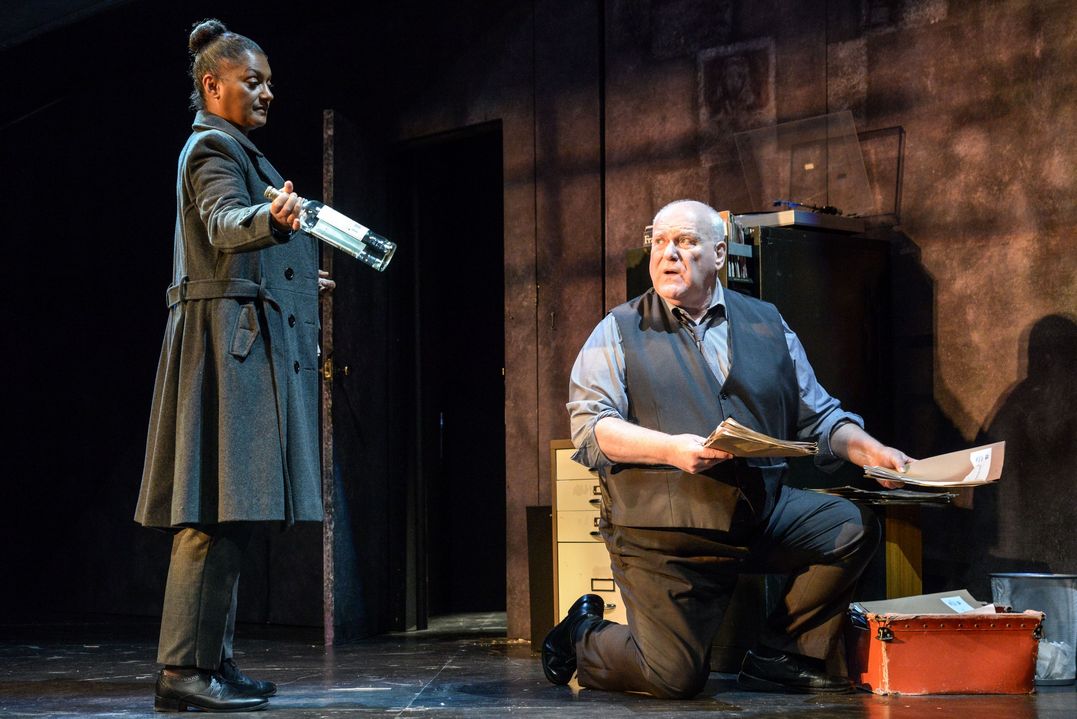
Rebus: Long Shadows is a new story, written specifically for the stage by Ian Rankin and Rona Munro. Having previously played John Rebus in the BBC Radio series, Ron Donachie again takes on the role. We see that this hard-bitten, Edinburgh detective has now retired and lives alone in his dusty flat, with only a few old case files for company. Donachie convincingly portrays a man who once achieved a great deal, but who knows his best days are behind him. He was never an athlete, and now he wheezes when he rises from his chair. ‘I canna dance to anything – I would’nae try.’ He is also well aware that his rough and ready style of policing is out-dated. He was never a man too closely tied to set procedures, and he is ill-at-ease in a world where DNA analysis has superseded gut instinct and street-wise intuition.
A chance encounter brings back some painful memories, and the long shadows of the title are those cast by Rebus’s sense of his own failings, and by two unsolved murders from the 1990s. We see him visited by the ghosts of the two girl victims. Dani Heron and Eleanor House are splendid as the shades of the murdered girls, but their very solid presence is a clumsily literal way to depict Rebus’s inner mental torment. The girls cry out for justice, and it seems that a current course case may offer an opportunity to achieve it.
Rebus is called on by his former assistant Siobhan Clarke, now successfully rising through the ranks. She embodies the new kind of policing; forms have to be filled in, policies must be adhered to, and there is no room for rule-bending. Cathy Tyson shows her to be a brisk, no-nonsense police officer, grateful for what she once learned from Rebus, but believing firmly that times have changed. Tyson looks the part, but there are times when she is burdened with some overly solemn, ponderous dialogue. A lighter touch with the moralising would have been welcome. However, Tyson and Donachie successfully convey a sense of an old partnership being reconfigured in new circumstances. Their joint efforts bring them to a confrontation with ‘Big Ger’ Cafferty, a notorious criminal who now lives in penthouse luxury.
Long Shadows is blessed with a splendid villain. John Stahl gives ‘Big Ger’ an imposing physical presence as he surveys all of Edinburgh laid out beneath him. He has the relaxed, expansive confidence of a man who has learned that you can get away with murder if you are untroubled by moral niceties. His showdown with Rebus is by far the best scene in the play, not least because the dialogue shifts from heavy-handed exposition to a much livelier exploration of character. Cafferty plies his guest with expensive whisky, while cheerfully telling him he’s ‘as much use as a condom in a geriatric ward’.
Stahl’s ‘Big Ger’ is a splendid creation, though I found his enthusiasm for the music of Sheena Easton a little hard to swallow. Donachie, too, is at his best in this scene, showing Rebus drifting into a drunken stupor, yet still alert and wily enough to seize an opportunity to strike back at his adversary. We learn that these two have history, and an uncomfortable amount in common. The notion that the cop and the criminal are morally not so very far apart is hardly new, but Donachie and Stahl’s full-blooded performances breathe new life into that tired idea. The plot of Long Shadows is by no means free from such clichés, and the revelations that come to light in this scene fail to convince. But flashes of mordant wit greatly liven up proceedings, and there is much to enjoy in seeing Rebus and ‘Big Ger’ sparring with each other.
Ti Green’s set design is suitably stark and dark; a broad staircase sweeps up in a curve and on into a gloomy nothingness. It has the ambiguity of the setting of a dream, or a nightmare. Initially this functions well to hint at Rebus’s haunted solitude, and later, when more brightly lit, it serves as a cavernous pub, a forensic storage facility, and as Cafferty’s lofty apartment. However, there is never any sense of the action taking place in Edinburgh. Fans of the Rebus stories will surely feel that this is a loss, for that great city plays a key role in Rankin’s novels. All in all, Rebus: Long Shadows is a rather uneven piece of work, but the performances are excellent, and there is much to enjoy in seeing Edinburgh’s famous detective brought to life on stage. ★★★☆☆ Mike Whitton 5th March 2019


